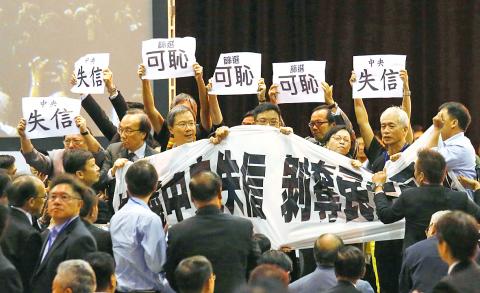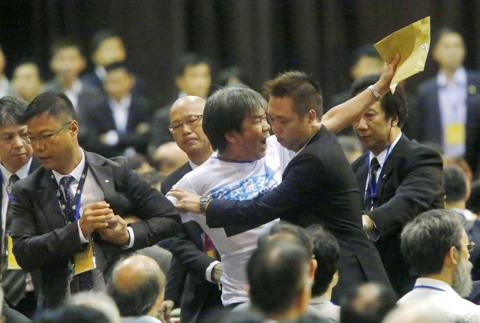Hong Kong pro-democracy activists yesterday heckled a top Chinese official, setting the stage for disruptive protests against the mainland’s landmark decision to limit voting reforms, but Beijing insisted that there would be no turning back.
Li Fei (李飛), deputy secretary-general of the Standing Committee of China’s National People’s Congress (NPC), was forced to speak over the cries of pro-democracy lawmakers and protesters during a meeting with local officials in the territory.
Brief scuffles erupted outside the venue as police used pepper spray to stop protesters from storming the hall, where Li told delegates that China would not tolerate a local leader who is disloyal to the mainland.

Photo: Reuters
“Anyone who does not love the country, love Hong Kong or is confrontational towards the central government shall not be the chief executive,” he said.
His visit came a day after democracy activists vowed an “era of civil disobedience,” including mass sit-ins at the territory’s financial district in response to Beijing’s decision to grant only limited reforms in the former British colony.
Democrat lawmakers said they would sink Beijing’s proposal when it comes before the territory’s Legislative Council early next year.

Photo: Reuters
“If it’s the same proposal decided by the NPC, we will vote against it,” Hong Kong Legislator Frederick Fung (馮檢基) said, adding that at least 25 of his colleagues have signed a declaration to shoot it down.
The proposal needs to win two-thirds support — or 47 votes — in the 70-seat legislature to pass.
For years, activists have agitated for the right to nominate candidates and to vote for Hong Kong’s leader, a campaign buoyed by a recent surge in discontent over rising inequality and perceived interference by Beijing. However, their hopes were dashed on Sunday.
The NPC Standing Committee announced that residents will be allowed to elect their next leader in 2017 — but candidates must be chosen by a pro-Beijing committee and must win the backing of more than half of the committee members to stand. Only two or three will be allowed to contest the election.
Democracy activists have called the restrictive framework a betrayal of Beijing’s promise to award Hong Kong universal suffrage by 2017 and say the nominating committee would ensure a sympathetic slate of candidates and exclude dissidents.
As Li approached the lectern to speak at the Asia World Expo convention center, veteran dissident Legislator Leung Kwok-hung (梁國雄) started shouting him down, his fist raised in the air. He was joined by a dozen pro-democracy lawmakers and some younger demonstrators who unfurled a banner and chanted: “The central government broke its promise, shameless.”
The meeting was briefly suspended while security officers removed the hecklers, to loud cheers and applause from pro-Beijing lawmakers.
Police confirmed they used pepper spray outside the venue when “protesters behaved violently.”
During an afternoon press conference Li criticized the pan-
democrats for heckling him.
“The door for dialogue has always been open, but this morning, it was they [the pan-democrats] who refused to communicate,” he said.
Li flew to Hong Kong from Beijing late on Sunday and was forced to drive past a crowd of largely student protesters gathered outside his hotel, in the kind of scenes that would be unthinkable on the mainland.
Following China’s decision to vet candidates, the pro-democracy group Occupy Central said on Sunday it would go ahead with its threat to take over the Central financial district in protest, at an unspecified date.
Shortly before Li’s speech activists launched what they described as a “slow drive” through the territory, the first of a string of promised small-scale civil disobedience acts.
About 10 cars, decked with flags, made their way deliberately slowly through the territory, accompanied by police motorcycles, but traffic was not noticeably disrupted.

INVESTIGATION: The case is the latest instance of a DPP figure being implicated in an espionage network accused of allegedly leaking information to Chinese intelligence Democratic Progressive Party (DPP) member Ho Jen-chieh (何仁傑) was detained and held incommunicado yesterday on suspicion of spying for China during his tenure as assistant to then-minister of foreign affairs Joseph Wu (吳釗燮). The Taipei District Prosecutors’ Office said Ho was implicated during its investigation into alleged spying activities by former Presidential Office consultant Wu Shang-yu (吳尚雨). Prosecutors said there is reason to believe Ho breached the National Security Act (國家安全法) by leaking classified Ministry of Foreign Affairs information to Chinese intelligence. Following interrogation, prosecutors petitioned the Taipei District Court to detain Ho, citing concerns over potential collusion or tampering of evidence. The

Seventy percent of middle and elementary schools now conduct English classes entirely in English, the Ministry of Education said, as it encourages schools nationwide to adopt this practice Minister of Education (MOE) Cheng Ying-yao (鄭英耀) is scheduled to present a report on the government’s bilingual education policy to the Legislative Yuan’s Education and Culture Committee today. The report would outline strategies aimed at expanding access to education, reducing regional disparities and improving talent cultivation. Implementation of bilingual education policies has varied across local governments, occasionally drawing public criticism. For example, some schools have required teachers of non-English subjects to pass English proficiency

‘FORM OF PROTEST’: The German Institute Taipei said it was ‘shocked’ to see Nazi symbolism used in connection with political aims as it condemned the incident Sung Chien-liang (宋建樑), who led efforts to recall Democratic Progressive Party (DPP) Legislator Lee Kun-cheng (李坤城), was released on bail of NT$80,000 yesterday amid an outcry over a Nazi armband he wore to questioning the night before. Sung arrived at the New Taipei City District Prosecutors’ Office for questioning in a recall petition forgery case on Tuesday night wearing a red armband bearing a swastika, carrying a copy of Adolf Hitler’s Mein Kampf and giving a Nazi salute. Sung left the building at 1:15am without the armband and apparently covering the book with a coat. This is a serious international scandal and Chinese

TRADE: The premier pledged safeguards on ‘Made in Taiwan’ labeling, anti-dumping measures and stricter export controls to strengthen its position in trade talks Products labeled “made in Taiwan” must be genuinely made in Taiwan, Premier Cho Jung-tai (卓榮泰) said yesterday, vowing to enforce strict safeguards against “origin laundering” and initiate anti-dumping investigations to prevent China dumping its products in Taiwan. Cho made the remarks in a discussion session with representatives from industries in Kaohsiung. In response to the US government’s recent announcement of “reciprocal” tariffs on its trading partners, President William Lai (賴清德) and Cho last week began a series of consultations with industry leaders nationwide to gather feedback and address concerns. Taiwanese and US officials held a videoconference on Friday evening to discuss the